Your Inner Map Of Reality
Here's Why You Think The Way You Do
The big picture of how your inner map of reality creates your feelings, thoughts, and behaviours
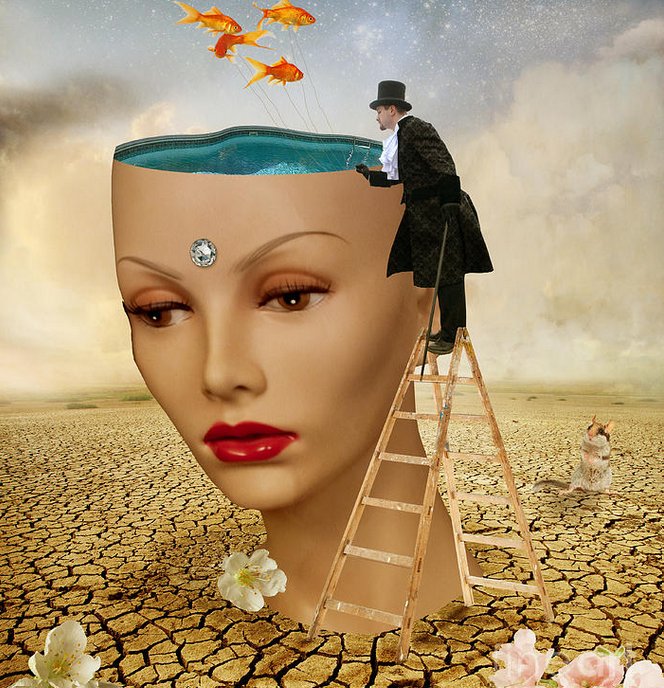
Introducing Your Inner Map Of Reality
Your inner map of reality is based on the filters of your own ethnic, national, social, family and religious background, and you interpret and experience life from the perspective of that map.
It makes your world more predictable and easier to find your way around. You observe, and draw conclusions about patterns of cause and effect, based on your inner map of reality, and your behaviour is shaped by those conclusions.
It can grow, change and adapt in response to new information and this in turn will be heavily influenced by your attitudes and beliefs.
Your inner map of reality will reflect your past experience and therefore influence your expectations and behaviour.
It represents the truth as you understand it.
The extent to which one person can understand another's inner map of reality is a measure of that person's empathy
Your Inner Map Of Reality - Here’s The Big Picture Of How It All Happens
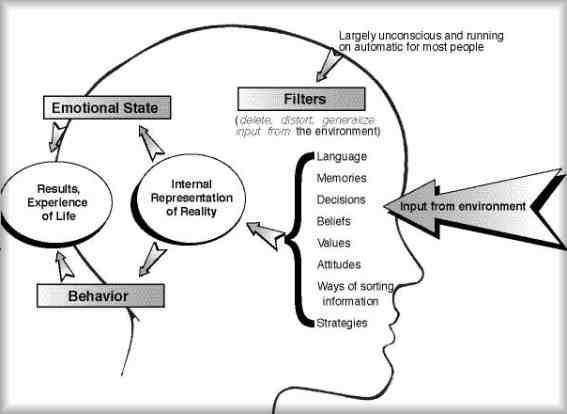
[1] Modalities - the internal representations we make based on our senses
These internal representations are made using one of several thinking modalities, which mirror our external senses. An internal representation can therefore be a:
- Picture
- Sound
- Smell
- Taste
- Feeling
- Touch
- Thought
[2] Sub-modalities
These internal representations can be constructed with a number of variables, which are called sub-modalities which are like a filing system - the mental equivalent of putting some documents in a folder of a certain colour and other things in a folder of another colour, to help you tell them apart and keep track of them.
There are three categories of visual sub-modalities.
- Size
- Colour
- Distance
It is through sub-modalities that you make the millions of distinctions you make every second. It is through sub-modalities that you are able to:
- Recognize faces and voices
- Keep track of beliefs and values
- See close to you or far away
- Have likes and dislikes
- Make millions of distinctions you make in every moment
[3] Strategies
These are a series of internal representations sequenced in a certain order. Everything you do and everything you feel is the end result of a strategy, a series of internal representations in a certain order.
Strategies are very important in determining how you experience life, for example:
- If you procrastinate, it’s the end result of a strategy.
- If you’re motivated, it’s the end result of a strategy.
- So if you’re happy, sad, anxious, depressed, or experience any other internal state, it’s the end point of a strategy.
By changing a strategy, you can change the end result.
[4] Cybernetic loops
These are the combination of strategies, states of mind and behaviours that create your experience of life, internally and externally.
The combination of any or all of the following three items are what scientists call a cybernetic loop:
- Internal representations, whether singly or in sequences called strategies
- Internal states
- External behaviours
Whenever you change one of them, the other two change.
So if you change your internal representations, you change your behaviour and your state.
If you change your state, it changes your behaviour and your internal representations.
If you change your behaviour, it changes your state and your internal representations.
Your Inner Map Of Reality - The Filtering Mechanism
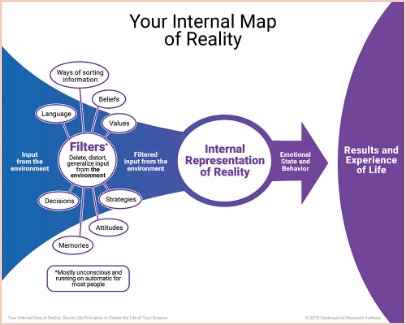
Here’s how the filtering mechanism affects how your internal map of reality operates to generate your feelings, thoughts, and behaviours.
Sensory input, as it comes in, is filtered in some way, through a fairly large filtering mechanism.
This filtering mechanism makes up a significant part of your internal map of reality.
Some of these filters include your beliefs, values, memories, decisions, the language you speak, your associations and methods you have developed for sorting, storing, and retrieving information, your strategies for making decisions, and a few other things.
These filters do three main things: they delete, distort, and generalize.
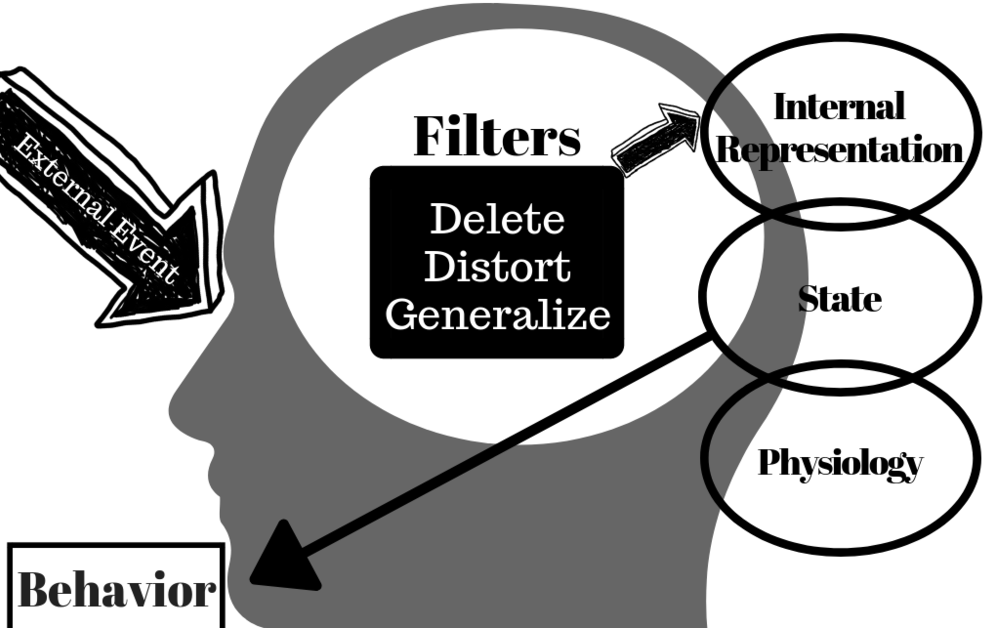
Though they do all of these things simultaneously, let’s look at them one at a time.
[1] Delete Filters
These filters delete some of the information. There’s just too much coming at you all the time, and a whole lot of it you just don’t notice—you immediately delete it, you disregard it.
As you walk through a room, there are an infinite number of details that hit your eye, but you don’t notice them all. You don’t notice every spot on the carpet, every scratch on the furniture, every whorl in the wallpaper, every item in the room, and so on. And the same thing could be said for smells, sounds, physical sensations, and so on.
When we talk about ideas coming at you, for instance, or evidence coming at you that you might take into account when deciding what to believe, what to do, who to be attracted to, how to make a decision, or something like that, we tend to delete whatever does not agree with our current beliefs, values, and so on.
Something would have to be huge and right in your face, and also, at the same time, be contrary to what you believe, in order to override your tendency to automatically delete those things that don’t agree with your beliefs.
[2] Distort Filters
The second thing these filters do is distort what comes in. There are many ways this could happen, but the one that’s pertinent here is that we distort what comes in, again, so that it verifies what we already believe and value, what we’ve already decided, and so on.
We take the part of what’s coming in that agrees, and keep it, and take the parts that don’t agree, and get rid of them, and in this way, we distort the pure input we receive. Or, we might add something that really isn’t there, and distort it in that way, or create some other misperception that distorts what’s coming in so that it conforms to the parameters of our current map of reality.
Here’s an example. If you believe that no one will ever love you, and someone turns you down when you ask them for a date, you might see that as evidence that you are, indeed, unlovable, even if the real reason was that the person was already in a committed relationship, or had another commitment that night, or you just weren’t their type.
You’ll either leave out some of the evidence, or add something to it, in order to distort what’s happened and make it agree with your belief.
[3] Generalise Filters
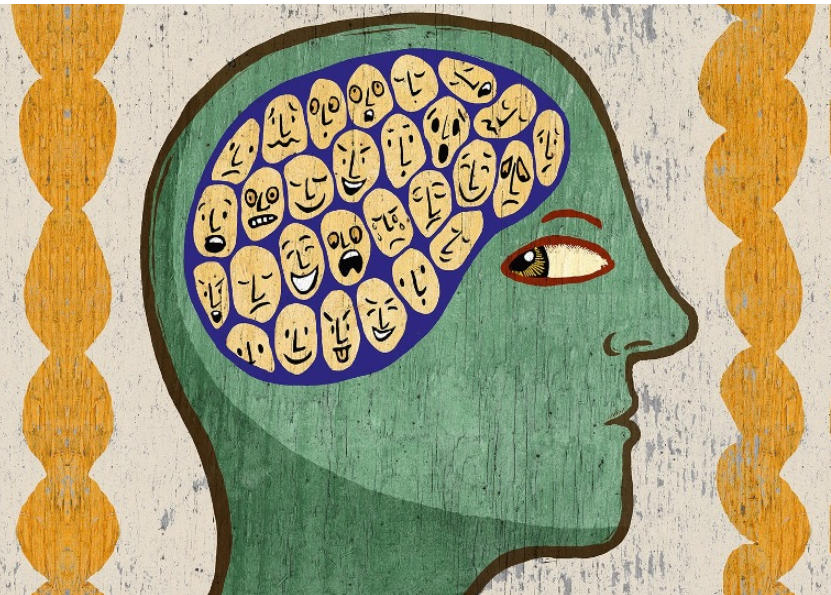
The third thing these filters do is to generalize. Generalizing is not necessarily a bad thing—in fact none of these three results of the filtering process are necessarily bad, as long as you do them consciously, as long as you know you’re doing them, and have some reason for doing them, and you’re doing it because it gives you a particular result you want. If we didn’t make generalizations, we would have to re-learn what a door was and how to open it every time we came to one.
Generalizations can be a bad thing, though, when they cause us to not see the differences that make something unique, and, because of that, assume that it’s exactly the same as something else that’s in the same general class, but has some significant differences.
Let’s say someone you were in a relationship with cheated you. They stole money from you and left. If you generalize that to mean "all men will steal from me" or "all men will take advantage of me," and assume that just because other men share the same gender with the jerk who stole from you, they’re also the same in other respects, including being dishonest and unreliable, you won’t be seeing things clearly and realistically, and might do something to create an outcome you don’t want.
One clue that generalizations are being made is when you hear words like "all, never, always, no one, everyone" - global words.
[4] Perceptions

What you perceive is not the pure input that initially came in through your senses
So these filters delete, distort, and generalize the input as it comes in, and after that happens, what you perceive is not the pure input that initially came in through your senses.
You perceive a filtered version, and that filtered version may or may not serve you and contribute to you getting what you want in life.
[5] Internal Representations
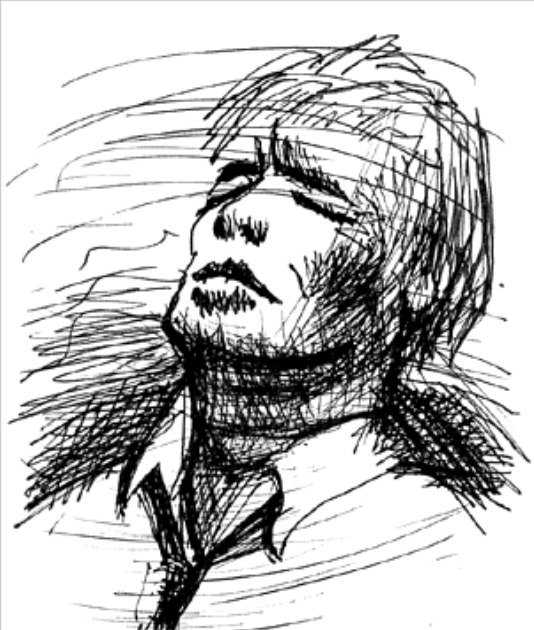
Then you make some sort of an internal representation of the results of this filtering process
Next, what happens is that you make some sort of an internal representation of the results of this filtering process. In other words, you make an internal representation of things you see, as an internal picture, what you hear, as an internal sound, and so on. Again, this goes on automatically, very rapidly, and almost always unconsciously.
The filtering mechanisms, and the whole process of making internal representations, and the resulting states and behaviours, happens unconsciously and automatically and is what ultimately creates your experience of life.
Please Note:
This presentation draws heavily on and fully acknowledges the work of:
Bill Harris of Centerpointe Research Institute
George Kelly's Personal Construct Psychology
Return from "Your Inner Map Of Reality" to: How To Change Your Life
LATEST ARTICLES
Master The Season You Are In - The Key to Fulfilling Your Purpose
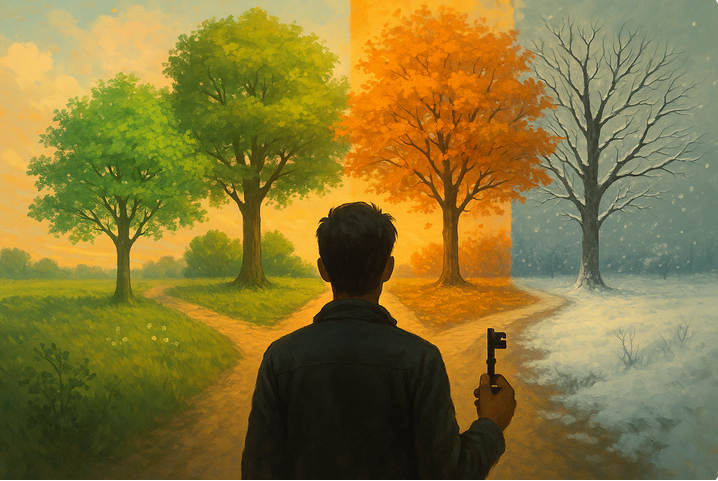 To fulfil your purpose, you must first master the season you are in. One of the biggest mistakes you can make in life is focusing all your energy on the next season instead of learning to master the s…
To fulfil your purpose, you must first master the season you are in. One of the biggest mistakes you can make in life is focusing all your energy on the next season instead of learning to master the s…The Inner Weight of Shame - Sustained By Attentional Fixation
 A Mind That Is Continuously Engaged In Self-Surveillance. Shame is one of the heaviest inner burdens a human being can carry. It does not announce itself loudly or demand attention through drama. Inst…
A Mind That Is Continuously Engaged In Self-Surveillance. Shame is one of the heaviest inner burdens a human being can carry. It does not announce itself loudly or demand attention through drama. Inst…Does Prayer Work? The Psychology of Prayer, Meditation and Outcomes
 Reality Is A Complex System Of Countless Interactions - Including Yours. So does prayer work? The problem is that the question itself is usually framed in a way that guarantees confusion. We tend to a…
Reality Is A Complex System Of Countless Interactions - Including Yours. So does prayer work? The problem is that the question itself is usually framed in a way that guarantees confusion. We tend to a…Living in Survival Mode Without Surrendering Mental Authority
Living in Survival Mode Without Surrendering Mental Authority
 Clear Thinking When You’re Just Trying to Stay Afloat. Many people today are overwhelmed because they are living in survival mode - not temporarily, but as a persistent condition of life. For many, th…
Clear Thinking When You’re Just Trying to Stay Afloat. Many people today are overwhelmed because they are living in survival mode - not temporarily, but as a persistent condition of life. For many, th…Manifestation Without Magic: A Practical Model
 Manifestation without magic is not a softer or more intellectual version of popular manifestation culture. It is a different model altogether. Popular manifestation teachings tend to frame reality as…
Manifestation without magic is not a softer or more intellectual version of popular manifestation culture. It is a different model altogether. Popular manifestation teachings tend to frame reality as…Staying Committed When You Can't See Progress - The Psychology of Grit
 Uncertainty Is Not The Absence Of Progress, Only The Absence Of Reassurance. One of the most destabilising experiences in modern life is not failure, but uncertainty and staying committed when you can…
Uncertainty Is Not The Absence Of Progress, Only The Absence Of Reassurance. One of the most destabilising experiences in modern life is not failure, but uncertainty and staying committed when you can…The Battle For Your Mind - How To Win Inner Freedom In A Digital Age Of Distraction
 From External Events to Inner Events. We often think of “events” as things that happen out there: the traffic jam, the rude comment, the delayed email reply. But what truly shapes our experience is wh…
From External Events to Inner Events. We often think of “events” as things that happen out there: the traffic jam, the rude comment, the delayed email reply. But what truly shapes our experience is wh…How to See Your Thoughts Without Becoming the Story
 A Practical Guide to Thought-Awareness. You can spend your life inside the stories of your mind without ever learning how to see your thoughts clearly and objectively. Most of the stuff we tell oursel…
A Practical Guide to Thought-Awareness. You can spend your life inside the stories of your mind without ever learning how to see your thoughts clearly and objectively. Most of the stuff we tell oursel…The Collison Decision Matrix - A Simple Framework for Better Choices
 The Collison Decision Matrix Is A Practical Everyday Thinking Tool. Most of us spend a surprising amount of time worrying about decisions. From small ones such as what to wear, what to eat, what to te…
The Collison Decision Matrix Is A Practical Everyday Thinking Tool. Most of us spend a surprising amount of time worrying about decisions. From small ones such as what to wear, what to eat, what to te…The Power Of Asking The Right Question
 The Power Of Asking The Right Question Lies In The Quest For Insight. To experience the power of asking the right question you must develop the practice of asking questions. The best way to improve th…
The Power Of Asking The Right Question Lies In The Quest For Insight. To experience the power of asking the right question you must develop the practice of asking questions. The best way to improve th…Site Pathways
 Here is a site pathway to help new readers of Zen-Tools navigate the material on this site. Each pathway is based around one of the many key themes covered on this site and contain a 150 word introduc…
Here is a site pathway to help new readers of Zen-Tools navigate the material on this site. Each pathway is based around one of the many key themes covered on this site and contain a 150 word introduc…
